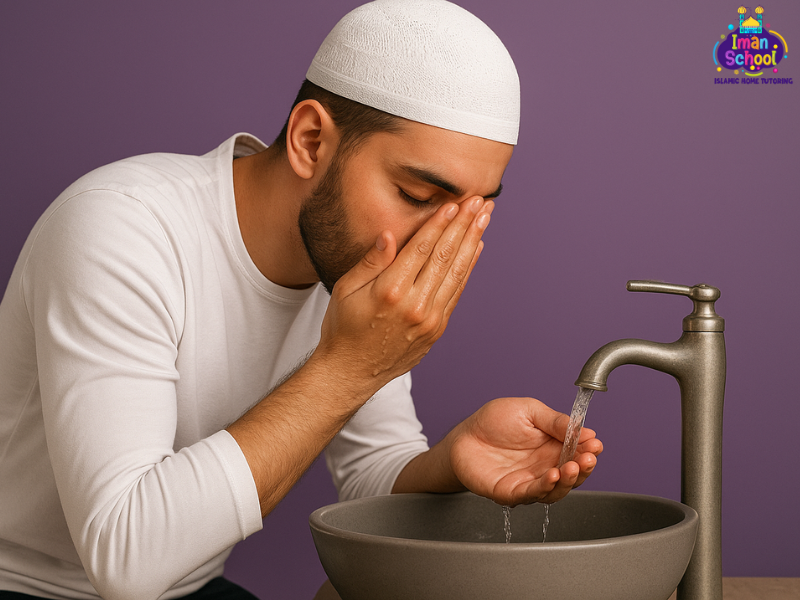For Muslims worldwide, ritual purity is the key to connecting with the Divine. Before standing for prayer or touching the Qur'an, a believer must be in a state of cleanliness, achieved through Wudu. If you are a new Muslim or simply want to ensure your daily ritual is performed correctly according to the Sunnah, you're likely asking: How do you perform Wudu with precision? Understanding the Wudu steps is essential, as this act of purification forms the basis for your connection with Allah.
What is Wudu and why is it important?
Wudu (or ablution in Islam) is the prescribed washing of specific parts of the body using clean water. The word Wudu meaning is derived from waḍā’ah, which signifies cleanliness and radiance.
Why is it important?
-
Prerequisite for Prayer: Wudu for Salah is mandatory. The Prophet Muhammad (PBUH) said, "The prayer of anyone of you who does Hadath (passes wind or urine/feces) is not accepted unless he performs Wudu."
-
Spiritual Cleansing: It is a means of spiritual purification, where minor sins are washed away along with the water, reinforcing the basic Islamic teachings.

Is Wudu required before reading the Qur'an?
Yes, maintaining Wudu is highly recommended and considered mandatory by the majority of scholars before touching the physical copy of the Qur'an (Mushaf). Allah says:
"None shall touch [the Qur'an] except the purified." (Qur'an 56:79)
While one can recite the Qur'an from memory or by looking at a screen without Wudu, touching the physical book requires this state of purity. Is Wudu mandatory for reading the Qur'an? For touching the actual book, yes.
How do you perform Wudu? (The Essential Steps)
The Wudu procedure must include the four what are the fard acts of Wudu (obligatory actions) found in the Qur'an (5:6) to be valid. The Sunnah actions are those recommended by the Prophet (PBUH) that complete the ritual.
The Four Obligatory Acts (Farā'id)
To know how to make Wudu step by step correctly, ensure these four are performed:
-
Washing the face fully, from the hairline to the chin, and from ear to ear.
-
Washing the hands and arms up to and including the elbows.
-
Wiping the head (Masah).
-
Washing the feet up to and including the ankles.
What is Niyyah and when do you make it for Wudu?
Wudu Niyyah is the sincere intention to perform Wudu for the sake of Allah.
-
When to make it: The Niyyah is made in the heart at the very beginning, just before you start the first action (washing the hands or reciting Bismillah). You do not need to articulate the Niyyah verbally; the heart's intention is sufficient.
The Full Sunnah Wudu Procedure (Step-by-Step)
The full Wudu procedure following the Sunnah acts ensures maximum spiritual reward:
1- Intention and Basmalah
Start with the Niyyah (intention) in your heart, and say: "Bismillah" (In the Name of Allah).
2- How do you wash your hands for Wudu?
Wash both hands up to the wrists three times, ensuring you rub the water between the fingers. This is a Sunnah act, performed before the Fard of washing the face.
3- How do you rinse the mouth and nose?
Rinse the mouth by swirling water inside it (Madmadah) three times. Then, rinse the nose by sniffing water into the nostrils and blowing it out (Istinshāq and Istinthār) three times. You can use one handful of water for both actions simultaneously.
4- Washing the Face
Wash the entire face three times from the hairline to the chin and ear to ear.
5- Washing the Arms
Wash the right arm three times from the fingertips up to and including the elbow. Repeat with the left arm three times.
6- How do you wipe the head (Masah) and ears?
This step is performed only once as the wiping of the head is a Fard act.
-
How to do Masah: Start by placing your wet palms at the front of your head (hairline) and wipe them backward to the nape of the neck. Then, bring them forward to the starting point.
- Wiping the Ears: Immediately following the head, wipe the inner part of the ears with the index fingers and the outer part with the thumbs.
7- Washing the Feet
Wash the right foot three times up to and including the ankles. Ensure water reaches between the toes. Repeat with the left foot three times.

What is the correct order for Wudu?
The correct order (Tartīb) listed above is obligatory (Fard) and essential for the validity of Wudu. The acts must be performed in sequence without undue delay.
How many times should each part be washed?
The prescribed number of times for most parts is three times (the full sunnah acts of Wudu), as demonstrated by the Prophet (PBUH). However, the obligatory minimum for all Farā'id is once. Is it better to do Wudu once or three times for each part? Three times is better as it fulfills the Sunnah, but once is sufficient.
How do you perform Wudu with a thick beard or long hair?
Thick Beard
For washing the face, water should reach the visible skin. During the face wash, run wet fingers through the beard from the underside (Takhleel), which is a recommended Sunnah.
Long Hair (Wudu rules for women)
When performing Masah (wiping the head), a woman only needs to wipe the front portion of her head. She does not have to wipe the entire length of her hair or untie her braid.
What are the conditions that invalidate Wudu?
Understanding what breaks Wudu is as important as knowing How do you perform Wudu. The main conditions that cause Wudu invalidated are:
-
Discharge of anything from the front or back passage (urine, feces, passing gas).
-
Deep sleep (where one is no longer conscious of surroundings).
-
Loss of consciousness (due to fainting or intoxication).
-
Touching the private parts directly with the palm of the hand.
-
Bleeding heavily (though scholars differ on this, it's generally safe to renew Wudu).
Does passing gas or burping break Wudu?
-
Passing gas breaks Wudu because it is a discharge from the back passage.
-
Burping does not break Wudu, as it is a discharge from the mouth/stomach and not from the required passages.
Can I keep my socks on when I perform Wudu?
Yes, you can perform Wudu with socks on (Masah 'ala al-khuffayn), provided certain conditions are met, such as:
-
The socks must be put on while you are in a state of purity (already having Wudu).
-
The socks must be thick enough to cover the ankles.
-
The permissibility for a resident lasts for one full day and night (24 hours).
-
The method involves wiping the top of the socks instead of washing the feet. This answers do I have to take off my shoes and socks for Wudu?
How do you perform Wudu if you have a medical condition?
If a medical condition (like chronic incontinence or continuous bleeding) prevents you from maintaining Wudu for long, you should perform Wudu immediately before the prayer time begins. This single Wudu is considered valid only for the duration of that specific prayer, even if the condition occurs during Salah. If water use is harmful, one can resort to what is Tayammum (dry ablution).
What Dua (Supplication) should be said after Wudu?
After completing the full Wudu steps, it is a highly recommended Sunnah to say the Dua after Wudu:
"أَشْهَدُ أَنْ لَا إِلَهَ إِلَّا اللَّهُ وَحْدَهُ لَا شَرِيكَ لَهُ وَأَشْهَدُ أَنَّ مُحَمَّدًا عَبْدُهُ وَرَسُولُهُ"
(I bear witness that there is no god but Allah alone, He has no partner, and I bear witness that Muhammad is His slave and Messenger). Reciting this is a guarantee of spiritual reward.

5 Mistakes That Can Invalidate Your Wudu
Even those who know How do you perform Wudu can make subtle errors:
-
Missing the Niyyah: Starting without the intention invalidates the whole act.
-
Forgetting an Obligatory Part: Failing to wash a part of the face or a patch of skin on the arms or feet.
-
Washing out of Order: Forgetting the correct order for Wudu (e.g., washing the feet before wiping the head).
-
Leaving the Water Barrier: Not removing nail polish, waterproof makeup, or dough that prevents water from reaching the skin.
-
Undue Delay: Allowing the first part of the body to dry completely before washing the next part (though scholars differ, it's best to avoid this).
Related Topics
- Dating in Islam
- What are the Islamic rules for adopting a child
- Can Women Lead Prayer
- What is the ruling on abortion in Islam
- Body Piercings Islamic Ruling
- Laser hair removal Islamic ruling
- Fake nails Islamic ruling
- Islamic ruling on tattoos
- Islamic Ruling on Eyebrows
- Why Can't Muslim Woman Pray on Their Period
- Can You Read Quran Without Ghusl
- Is marriage to a non-Muslim allowed in Islam
FAQs about How do you perform Wudu
What is the correct way to wipe the top of your head (Masah)?
The correct way to wipe the top of your head (Masah) is to place wet hands at the front hairline, move them backward to the nape, and bring them back to the starting point, all in one single motion.
Does Wudu break if you touch your spouse or a non-relative?
Scholars differ on this. According to the Hanafi school, touching a spouse does not break Wudu. According to the Shafi'i school, it generally does. It is best to adhere to the ruling of your school of thought or renew Wudu to be on the safe side.
Do I have to take off my shoes and socks for Wudu?
Normally, yes. However, if you are already wearing thick socks (or leather slippers/boots) that were put on while you had Wudu, you may perform Wudu with socks by wiping the top of them instead of washing your feet.
Is it better to do Wudu once or three times for each part?
Performing the washing three times is better as it is the full sunnah acts of Wudu and carries a greater reward. However, washing once is sufficient and fulfills the obligation.
Can I pray with nail polish or makeup on if I have Wudu?
You cannot perform Wudu if you have nail polish or waterproof makeup (like waterproof mascara) on your skin, as these items create a barrier preventing water from reaching the skin, which invalidates the Fard of washing. Once Wudu is validly performed, you can keep the makeup on for prayer.
Best Online Courses for Understanding Islam
Do you want to move beyond the physical movements and understand the spiritual significance of every action in your faith? Learning How do you perform Wudu correctly is just the beginning. Iman School is a trusted online academy offering high-quality courses that provide deep understanding of Islamic rituals, ethics, and jurisprudence.
Enroll in our online courses today to perfect your worship and deepen your connection with Allah.




